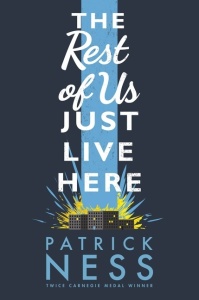I enjoyed The Rest Of Us Just Live Here so much I read it in essentially one sitting, stopping only briefly in the middle to make some toast. It’s thoroughly engrossing and if not for the actual physical need to ingest person-fuel – a weakness in my character, not the book itself – I probably wouldn’t have taken even that short break.
In many ways this book comes along as a sort of antidote to the habitual, ever-present trope of the extraordinary individual, the Chosen One. While I wouldn’t ever argue against that kind of narrative, and in fact I feel it has an important place in YA in particular, it is also refreshing to take a look at characters that inhabit their own story but who do not need to be the most super-special snowflakes without whom the universe dies in fire and blood. The story of The Rest of Us Just Live Here belongs to the people who sit on the margins of most other tales; the girl behind Harry Potter in Potions, hoping Snape doesn’t notice she didn’t do her homework; Buffy’s teenage neighbour, who pretends not to see her climbing out her bedroom window every other night. These are the characters who are just hoping to survive the Prom.
The Rest of Us Just Live Here is concerned with the everyday lives of Mickey, his sister Mel, best friend Jared, and friend/love interest Henna, in the run up to their rapidly approaching graduation. While it is utterly bound up in natural concerns, it still manages to be full to the brim with pain and suffering, drama and unrestrained desires. In many YA texts, particularly in fantasy/horror/sci-fi, the supernatural or unreal, operates as a metaphor for real life issues that might affect teenagers; werewolves and puberty, vampires and sex (and not drugs for some reason), Government-engineered televised murder Olympics for the toll our social structures and expectations place on our youth. You know the kind of thing I mean.
In The Rest of Us Just Live Here, the eerie supernatural is a fact of existence and the characters are far more concerned with their personal problems. Cyclically reoccurring invasions of aliens, vampires and the like have inured the majority of the local teens to the issue, while the adults seem to mysteriously forget or, more likely, consciously fail to remember. The previous weird cycle, for instance, claimed Henna’s brother, but that loss is couched in real, human terms. Her reaction is not to embark upon a lifetime of vengeance-seeking violence, but rather to mourn and continue on, like any real teenager might. Mickey’s mental health issues are not a lead-in to dramatic psychic powers. Jared, being the exception that proves the rule, might be part-God, but he wants nothing to do with the strangeness breaching their story.
The book focuses on unrequited love, family tension, boy-band pop concerts and car-crashes more than magic, and cleverly displaces the expectations of the genre. The tale of the Chosen One, here nestled in the background figure of indie-kid Satchel, is sketched in amusing brevity in the chapter openings. The twisting, melodrama of that story makes a surreal companion to ordinary concerns of Mickey and his friends.
I found The Rest of Us Just Live Here a refreshing, captivating read, full of humour, sadness and hope, and well worth reading in one long night. Nearly a week later I’m still thinking about it. The best thing any book can do is stay with you after you’ve started something else.
The Rest of Us Just Live Here is out now in Ireland and the UK, and will be released in the US in October. You should buy it.
